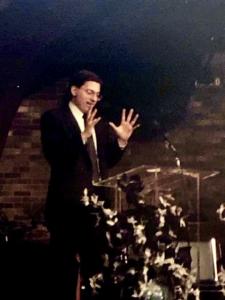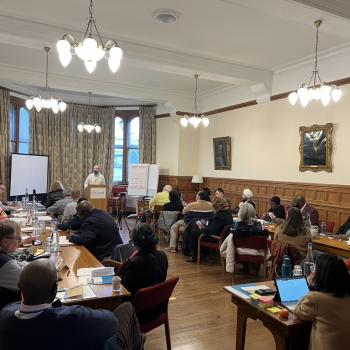American evangelicals have a problem with the truth. That moral failing is more than scandalous; it’s ruinous to all. Why would people that claim to follow a Lord who called himself “the truth” be so afraid and even hostile to that quality? I think the answer is simple and terribly complex.
My Long Affair With Evangelicalism
In the mid-1980s, I was a young, fresh-faced traveling stemwinder of an evangelist. I crisscrossed the country, mounting pulpits in 48 states and several foreign countries. On any Sunday morning, I may have been at a high-tech plexiglass pulpit of a mega-church. Thousands of people would give me standing ovations. That same Sunday evening, I could have been using a worn-out music stand at a tiny start-up church. It was an exciting period in my ministerial vocation. I saw all kinds of churches in urban, suburban, rural, and remote locations.

By the time I quit jumping on planes, trains, automobiles (and occasional busses) to herald the glorious gospel, I had visited more than a thousand congregations. In church lobbies, an incalculable number of “brothers and sisters” shook my hand, hugged my neck, kissed my cheeks, and signed up for my newsletter. More than 50,000 sent me money, often with personal notes about themselves and their families. I had spent three decades keeping company almost exclusively with evangelicals.
Let’s say by age 50, I knew evangelicalism backward and forward–especially the American brand. I now know it even better after another 15 years at a comfortable distance. As I approach a half-century at every level of evangelical engagement, I’ve come to some unwelcome conclusions about it. One is that our dysfunctional religious family has told itself and others a lot of lies. We’ve hidden the truth, denied reality, and pushed fiction as if it were fact.
Can We Fix Our Evangelical Truth Problem?
It doesn’t have to be this way. If my badly corrupted spiritual family bravely faced itself truthfully, transparently, and self-critically, it could reclaim its integrity. Instead, it continues to trade the virtue of honesty for vices of cultural, political, and even personal domination and subjugation. We see it in everything from dismissing LGBTQ+ persons to contempt for migrant refugees to its embrace of political violence.
In January 2017, at one of the several prayer services attended by the newly inaugurated evangelical favorite, President Donald Trump, I told a nationally known ministry leader, “Maybe Trump is a sign we need to return to the Sermon on the Mount.” In a flash of anger, he retorted, “I have serious work to do. Maybe you have time for that, but I don’t.” Four years later, Donald Trump, Jr. would say publicly of key points in Jesus’ sermon, “I understand the mentality, but it’s gotten us nothing!”
Like every human institution, American evangelicalism has never been perfect. As with every individual member and grouping within it, evangelicalism’s vices and virtues have ebbed and flowed. A movement that once championed the indigent became the purveyor of privilege. The “church on the other side of the tracks” was replaced by gleaming temples of prestige and prosperity. The once-conscientious objectors to war and all forms of violence enthusiastically embraced a popular gun culture. Many evangelicals later applauded the sacking of the United States Capitol with its brutal attack on law enforcement officers. Some even called for lynching the Vice President–who was one of their own!
I’ve witnessed so much good and bad during my sojourn through the evangelical forest. I’ve seen rivers of empathetic compassion for the ones we often refer to as “the lost, the lonely, and the loveless.” I’ve seen hard-working common folks spend their savings to help down-and-outers, physicians give up priceless vacation time to perform life-saving surgeries for those with no access to medical care, and pastors roll out of bed in the middle of the night to console congregants after a loved one’s tragic death. Yes, there’s plenty of virtue in my community; but it’s the plenty of vices that bring me back to my original point.
Tangling With the Truth
 Dealing with the truth is a tough challenge for everyone. My theory on why evangelicals have a particularly difficult time reconciling the facts with fiction–or worse, burying the facts with evasion or even deception–is because our faith is fragile. We often boast that the gospel we proclaim is simple, but it’s actually simplistic. When I was that young traveling evangelist, many born-again Christians sported a bumper sticker reading, “God said it. I believe it. And that’s good enough for me.” Variations on the theme persist today. The cute aphorism belies the arduous, convoluted, and unpredictable faith of Moses, David, the Prophets, the Apostles, and the Jesus of Gethsemane.
Dealing with the truth is a tough challenge for everyone. My theory on why evangelicals have a particularly difficult time reconciling the facts with fiction–or worse, burying the facts with evasion or even deception–is because our faith is fragile. We often boast that the gospel we proclaim is simple, but it’s actually simplistic. When I was that young traveling evangelist, many born-again Christians sported a bumper sticker reading, “God said it. I believe it. And that’s good enough for me.” Variations on the theme persist today. The cute aphorism belies the arduous, convoluted, and unpredictable faith of Moses, David, the Prophets, the Apostles, and the Jesus of Gethsemane.
Our faith goes untested, unchallenged, and unexamined for too many of us. Instead of a durable, robust, and salutary philosophy of life, we end up with a weak, tenuous, easily threatened superstition; one we must irrationally defend at all costs. Yet, Christians should not be afraid of asking, Why? How? and What?
Lack of critical thinking, investigation, grappling with facts, and reconciling imaginative hope with how things really are has left us gullible, embarrassed, and unreasonably defensive. As pilgrims making our way through God’s world, we should be as curious as anyone else and equally uncertain. Humility is to mark the follower of Christ. To think we know it all, understand everything, and are beyond getting anything wrong is the kind of haughtiness the Bible warns will bring us down. (See Proverbs 16:18)
Being humble means doubting ourselves, interrogating what we hear and see, and holding our opinions loosely. When it comes to the Bible, we need to actively wonder whether we’re interpreting it right, whether we understand it in its proper context, and whether it speaks to what we experience in our time. Because we don’t interrogate the text, we often misunderstand, misapply, and even misquote it. We misuse scripture to justify ourselves, control others, or bolster the appeal of whatever school of biblical interpretation we fancy.
For too many years, I contributed to this crisis by leaving unquestioned the erroneous, incredible, and sometimes dangerous pronouncements made by evangelical celebrities and influencers. I would critique them behind the scenes, even mock them backstage as others demagogued their opinions loudly over the P.A. system. Still, I remained silent in public.
The damage all this has done to the witness of the gospel, human flourishing, and evangelicalism itself has reached emergency proportions. It is not unlike the religious, cultural, and political catastrophe caused by the 1930s German evangelical Church support for Adolf Hitler and his Nazi Party. But there is a path out of it.
Evangelicals and the South African Solution
South Africa, in the wake of consummately cruel Christianized apartheid, gives us a model for what American evangelicalism needs: a courageous reconciliation with the truth. That country’s experience with its Commission of Truth and Reconciliation demonstrates what’s required of us. Among much more, it will at least include suspending our certitude, engaging in healthy self-doubt, and processing the facts about our history.
The American evangelical story is not hagiographic, emphasizing only the best highlights. It includes admitting our compromise with slavery and racism, our abandonment of women’s rights a century and a half ago, and our current shielding of sexual abusers. It means facing the painful number of Bible believers who want to exclude the migrant rather than obey the divine mandate to welcome the stranger.
Truth and Reconciliation follow the scriptural pattern of confession: We name our sins before God, take complete ownership of them without deflection or mitigation, and humbly seek forgiveness from heaven and those we’ve harmed. Christians need to look no further than the Lord’s Prayer, “Forgive our trespasses.” For evangelicals, the spiritual journey begins with the conscious acceptance that I am a sinner. I have done wrong, made grave mistakes, failed God, myself, and others–and that I–we–didn’t get it right.
At the core of the South African model, though, is safety for witnesses, survivors, and dissenters. Evangelicals don’t do that very well. The people who champion God’s forgiveness of our sins too often look to punish others for theirs. Historically–and lately–we’ve vilified, intimidated, and vanquished those who tell us the sins we’ve committed. That, too, must change. Naked retribution is itself a sinful violation of God’s will. (See Galatians 6:7-8)
Unquestioned certainty about oneself and contempt for all others, along with their ideas, perspectives, experiences, and opinions, are not the marks of the born-again believer but of the arrogant religious legalist Jesus unequivocally denounced.
It’s time for those claiming to be followers of “the way, the truth, and the life” to act like it. It’s time for us Christians to tell ourselves the truth, confess it to God and others, and face the real consequences of our failures and the injuries we’ve inflicted. Only then can we effectively make restitution and repair the damage we’ve done.
In my next post, I’ll suggest a starter list of our violations and those harmed by them. We can begin there.
“Jerusalem has sinned greatly and so has become unclean. All who honored her despise her, for they have seen her nakedness; she herself groans and turns away.” – Lamentations 1:8














